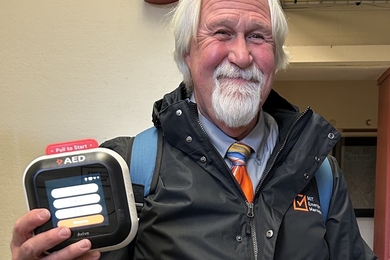Important change for some e-mail attachments
Starting Oct. 27, the MIT mail system will no longer distribute e-mail attachments that self-execute on receipt. This change in policy is in response to the growing trend to use these attached files to exploit operating system and application security flaws. Executable e-mail attachments carrying worms and viruses tend to be destructive and fast-moving. Such files often have filename extensions such as .exe, .scr or .bat.
E-mail rejected because of an executable attachment will not be delivered, and a note will be returned to the sender acknowledging that the e-mail was not delivered due to MIT's e-mail operating policy. Distribution of non-executable e-mail attachments, such as Word documents, Excel spreadsheets and PowerPoint presentations, will continue uninterrupted.
Those who need to exchange executable files should consider alternatives, such as the file transfer protocol (FTP). IS supports several secure FTP options. For more information, see http://web.mit.edu/is/topics/filetransfer. In the future, any executable files to be exchanged through the MIT mail system will first need to be packaged (by zip, tar, etc.).
The Mail Hub Attachment Filtering web page at http://web.mit.edu/services/mail/attachments.html has more information, including a list of executable extensions that will be filtered.
Mailman offers mailing-list spam controls
Concerned about frequent spam or other unwelcome mail sent to your e-mail list? Want the flexibility of managing complex lists via the Web? IS offers limited support of Mailman, a mailing-list system with a web interface for administration and user subscription. Mailman offers features such as moderated lists and filtering based on sender; optional archiving of list e-mail; and digest delivery. A number of lists, such as aac-aoquery, have been converted to Mailman.
For a full list of features, see http://web.mit.edu/lists/mailman. To request a Mailman list, contact User Accounts at accounts@mit.edu or 253-1325.
Laptop tagging offered
To reduce the likelihood of laptop theft, the Information Security Office, the Insurance Office and MIT Police strongly recommend getting a tamper-proof tag offered by a company called STOP (Security Tracking of Office Property). The $10 tag reduces the potential for resale of stolen property; an additional sticker warns potential thieves of the theft protection system. STOP also provides a registration service to assist in the recovery of a misplaced or stolen laptop. See http://web.mit.edu/security/www/stophome.html for a schedule of campus tagging sessions.
Gain expertise through user groups
Computer user groups at MIT serve as forums where people help each other get more out of their computers and applications. Groups generally focus on a platform such as Windows or Macintosh, a specific application or an aspect of development. A typical meeting, often held at lunch hour, may include a question-and-answer period and a presentation by a member or guest speaker. Most groups have an e-mail list where members can post and get answers to their questions. For a list of user groups at MIT, go to http://web.mit.edu/mugs.
Digitalk is compiled by Information Systems
A version of this article appeared in MIT Tech Talk on October 22, 2003.





